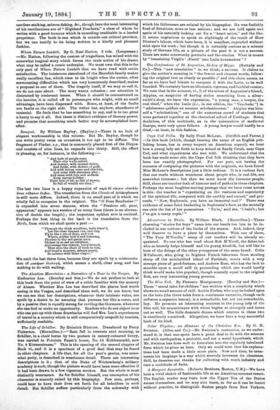Bouquet. By William Bayley. (Bayley.)—There is no lack of elegant
workmanship in this volume. But Mr. Bayley, though be can write pretty verse on occasions, is too apt to be diffuse. The fragment of Pinder, e.g., that is commonly placed first of the Dirges, and consists of nine lines, he expands into thirty. Still, the effect pleasing, as, for instance, in the following :—
" And beds of purple roses
Their city n alls enfold, And bowers, with incense laden, And fields, with flowers of gold. And with horses some and chariots, And some with chessmen play ; And some with lute and anthem Keep joyous holiday : Their tree of life so full of flower, So full of wealth are they."
The last two lines is a happy expansion of rasa 5i co:plass staiv3i5 Is-ax 74bIZAEY 61■Sos. The translation from the Clouds of Aristophanes is still more diffuse. Indeed, there is no small part of it which we wholly fail to recognise in the original. The "0 Fens Bandusiae !" is expanded into seven stanzas, when the " Persicos odi, puer, apparatus," appears in:a version of as many lines (there is an alterna- tive of double the length) ; the important epithet arta is omitted. Perhaps the best thing in the book is the translation from the Birds, from which we shall quote a part :— " Through the thick woodbine, leafy-tress'd,
Let the clear descant and ring Up to the a. ate of Zeus, and rest Where, golden hnir'd and listening, Phinbus to thy sad psalm anon Chimes in as sad an antiphon, And sweeps the cithern, ivory-braced, That stirs the choir of Gods to rise, And tread a measure, solemn-paced, In cadence with thine elegie.." .
We omit the last three lines, because they are spoilt by a mistransla- tion of iiakeipcov I,XoXvyi, which means a shrill, clear song, and has nothing to do with wailing.


































 Previous page
Previous page